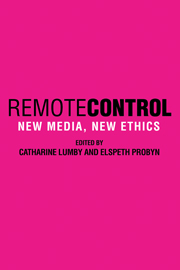Book contents
- Frontmatter
- Contents
- List of Contributors
- Acknowledgements
- 1 Introduction: An Ethics of Engagement
- 2 Real Appeal: The Ethics of Reality TV
- 3 Arguing about Ethics
- 4 ‘Their own media in their own language’
- Beyond the Disconnect: Practical Ethics
- 5 A Viable Ethics: Journalists and the ‘Ethnic Question’
- 6 Ethics, Entertainment and the Tabloid: The Case of Talkback Radio in Australia
- Money versus Ethics
- 7 Eating into Ethics: Passion, Food and Journalism
- Beyond Food Porn
- 8 Ethics impossible? Advertising and the Infomercial
- Pitching to the ‘Tribes’: New Ad Techniques
- 9 Diary of a Webdiarist: Ethics Goes Online
- 10 Control-SHIFT: Censorship and the Internet
- Representing the Asylum Seekers
- 11 The Ethics of Porn on the Net
- Ethics and Sex
- 12 Grassroots Ethics: The Case of Souths versus News Corporation
- 13 Great Pretenders: Ethics and the Rise of Pranksterism
- The Limits of Satire
- Index
4 - ‘Their own media in their own language’
Published online by Cambridge University Press: 18 December 2009
- Frontmatter
- Contents
- List of Contributors
- Acknowledgements
- 1 Introduction: An Ethics of Engagement
- 2 Real Appeal: The Ethics of Reality TV
- 3 Arguing about Ethics
- 4 ‘Their own media in their own language’
- Beyond the Disconnect: Practical Ethics
- 5 A Viable Ethics: Journalists and the ‘Ethnic Question’
- 6 Ethics, Entertainment and the Tabloid: The Case of Talkback Radio in Australia
- Money versus Ethics
- 7 Eating into Ethics: Passion, Food and Journalism
- Beyond Food Porn
- 8 Ethics impossible? Advertising and the Infomercial
- Pitching to the ‘Tribes’: New Ad Techniques
- 9 Diary of a Webdiarist: Ethics Goes Online
- 10 Control-SHIFT: Censorship and the Internet
- Representing the Asylum Seekers
- 11 The Ethics of Porn on the Net
- Ethics and Sex
- 12 Grassroots Ethics: The Case of Souths versus News Corporation
- 13 Great Pretenders: Ethics and the Rise of Pranksterism
- The Limits of Satire
- Index
Summary
Part A – Journalism and the Indigenous polity
Indigenous peoples have the right to establish their own media in their own language. They also have the right to equal access to all forms of non-Indigenous media.
States shall take effective measures to ensure that State-owned media duly reflect Indigenous cultural diversity.
United Nations Draft Declaration on the Rights of Indigenous Peoples, Part IV, Article 17, 1994 (still not ratified).IN THE COURSE OF RESEARCHING OUR BOOK ON THE REPORTING AND reception of Indigenous issues in the Australian media, Alan McKee and I became keenly aware of a standard liberal approach to the subject of Aboriginal people, ethics and the media. It goes like this: you round up the ‘usual suspects’, which comprise hostile reporting, racial prejudice, the stereotyping of Aboriginal people, and their sacrifice at the altar of a good story (also known as a fast buck). You offer a quick critique of the corporate greed and insensitivity that drive the media. And you make a plea for ethical behaviour by individual journalists. Everyone then goes home, none the wiser.
Our own three-year study, which was supported by an Australian Research Council Large Grant, was an attempt to broaden the framework for thinking about the way Aboriginal affairs are reported in the media and how Indigenous people are represented both as media professionals and as subjects in the media. Where previous work in this field has concentrated on finding examples of racist and ‘negative’ coverage, we set out to put questions of media, racist and Indigenous representation into a larger context. In concrete terms, this meant studying a much broader range of media coverage than is normally included in research of this kind – we looked beyond news and current affairs reporting to entertainment and life-style media.
- Type
- Chapter
- Information
- Remote ControlNew Media, New Ethics, pp. 42 - 66Publisher: Cambridge University PressPrint publication year: 2003
- 4
- Cited by



